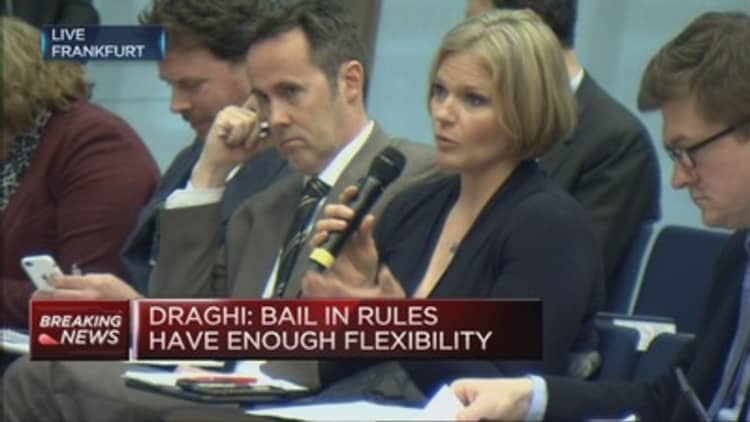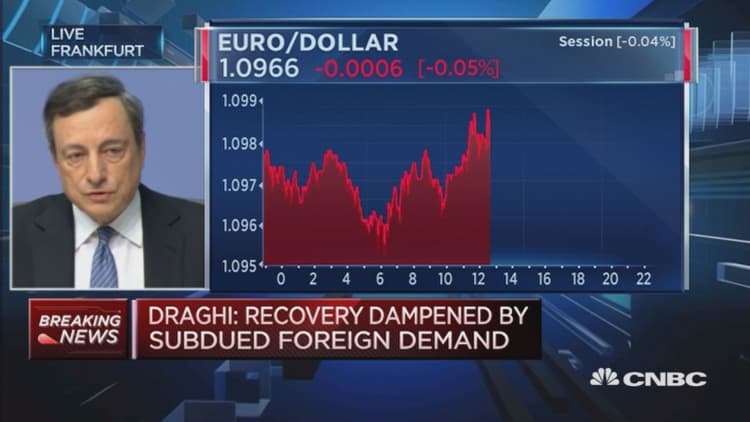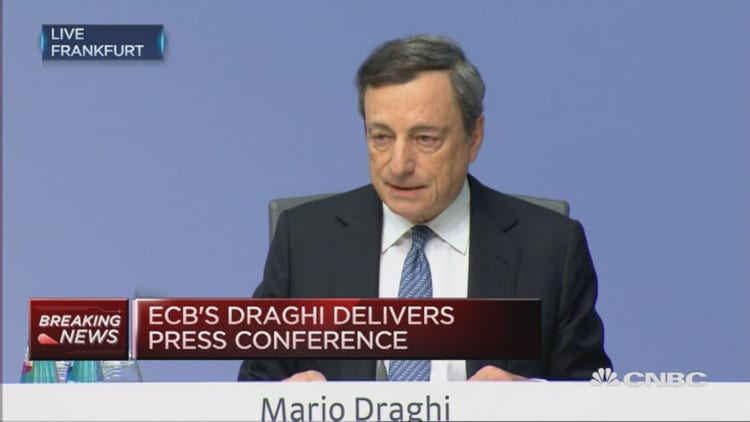


The European Central Bank held its key interest rates and its quantitative easing (QE) program steady, matching investor expectations.
Despite question after question from reporters in a Q&A session following the announcement, ECB President Mario Draghi continued to affirm there had been "no discussion" regarding the question of when the bank's trillion-euro bond-buying program would be wound down.
The only concessions to the tapering talk were a comment that it would "not last forever" and that although an "abrupt" end to purchases had never been discussed, he considered it "unlikely".
There was minimal market reaction to either the announcement or the press conference save the euro regaining some ground lost earlier in the day to the U.S. dollar and U.S. stock futures turning lower.
Prior to the announcement, the majority of observers had already been looking beyond today's meeting, to a greater likelihood of changes being declared at its final get-together of the year on December 8.
The sell-off of bonds in major markets, particularly the U.K., the U.S. and Germany, which has gained steam in recent weeks, has taken some of the immediate pressure off of Europe's central bank, and its president, to introduce further easing measures immediately.
Valentin Marinov, Head of G10 FX Research at Credit Agricole CIB told CNBC that he expects the ECB to announce in December it will extend the programme until September.
"We believe that the constellation of factors, really on the one hand the fact that fixed income markets have been coming under some pressure plus potentially the tweaks that the ECB could introduce, will allow it to buy more time - like 6 months' worth of QE - but then we think that by September next year, the ECB will have to seriously consider reducing the pace of those purchases just for the sake of staying in the markets a bit longer as that's also when the asset scarcity issue will start biting in earnest," he explained.
The fact that no forecast revisions were due today but are during the December meeting is another reason why markets did not expect the ECB to make substantive announcements today. This in addition to the fact a delay buys the policymakers more time in deciding how to navigate the historically unusual backdrop to the global economy.
Indeed, when asked during the media briefing why the ECB was waiting until December, Draghi explained, "We want to see all the inputs that are useful to have this discussion. That's important for having one view about which the Governing Council members can express their opinion. Right now we have options – to be more precise we didn't go at all into the exercise of counting views of majorities or not."
The ECB delivered its last set of forecasts at its meeting in early September, when it marginally upped its economic growth outlook for the euro zone for 2016 but lowered it for 2017 and 2018. The central bank now sees growth in the 19-country bloc averaging 1.7 percent this year, having earlier estimated it would reach 1.6 percent. In a direct flip, new growth forecasts for 2017 and 2018 of 1.6 percent mark a downwards revision from the bank's June estimate of 1.7 percent growth in each of these years.
The central bank's inflation forecast for this year was held steady in June at 0.2 percent as its 2018 estimate was also maintained at 1.6 percent. However, the ECB cut its 2017 forecast to 1.2 percent from 1.3 percent.
In prepared remarks following the monetary policy announcement, while Draghi said there were no signs yet of a "convincing upward trend in underlying inflation", he added inflation would be likely to pick up in the next few months.
Inflation has been sharply in focus in the six weeks since these forecasts were issued given the ramp-up in bond yields and inflation expectations in certain key developed market countries.


